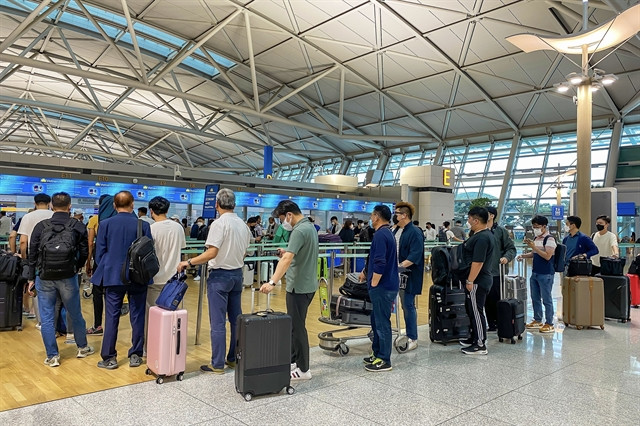
In the last two years, Vietnamese tourism has been under the pressure of the pandemic. In 2020, the number of international guests dropped by 80 per cent, and the total revenue from tourists dropped by 60 per cent compared to 2019. The total revenue even dropped deeper to 96 per cent in 2021.
To streamline the visa application process and aid the tourism sector's post-pandemic recovery, Prime Minister Phạm Minh Chính has called for a reform of electronic visa applications.
PM Chính ordered authorities to be flexible and creative in the era of globalisation. The market for tourism services must be diverse in terms of giving the customer what they need.
In the last two years, Vietnamese tourism has been under the pressure of the pandemic. In 2020, the number of international guests dropped by 80 per cent, and the total revenue from tourists dropped by 60 per cent compared to 2019. The total revenue even dropped deeper to 96 per cent in 2021.
In 2022, Việt Nam completely reopened its tourism industry and although tourism is gradually recovering, the number of international guests in Việt Nam only reached 70 per cent of the expected goal in 2022. This is due to Việt Nam not having a breakthrough solution to boost post-pandemic tourism. The Government leader ordered the Ministry of Culture, Sport and Tourism to complete the directive to attract international tourists to Việt Nam in the new era, which is due in January.
At the seminar for attracting international tourists organised in late December 2022, Nguyễn Văn Hùng, Minister of Culture, Sports and Tourism, said that many countries were competing with Việt Nam by the no-visa policies.
Malaysia and Singapore have 162 countries under the visa-free list, the Philippines have 157 countries, Thailand has 65, and Việt Nam only has 24 countries on its list.
Whilst most ASEAN countries have a 30 to 45-day visa-free duration, Việt Nam had a 15-day visa-free policy, which is too short compared to other countries in the region and inappropriate for the long duration of international guests, especially in markets such as Europe, which tourists usually holiday for three or four weeks.
To boost international guests to Việt Nam, Hùng recommended an e-visa application for all guest markets and simplifying the application process. Hùng also suggested lengthening the visa-free duration for international guests to 30 days and testing the visa application at border gates.
Hoàng Nhân Chính, Head Secretary of the Travel Advisory Board of Việt Nam (TAB), said that the visa-free list needed to be expanded, and the duration must be extended, and guests could have the ability to reenter multiple times. E-visa application websites must have an easy-to-search domain.
However, the visa is not the main reason behind tourism's stagnation, according to Deputy Minister of Public Security Lương Tam Quang.
From March 15, 2022, the Ministry of Public Security has restored the visa policies and applied many new rules to fit the current situation, according to Quang. There are 80 countries and regions with e-visa for Việt Nam immigration.
"After the testing of e-visa, the Ministry is currently upgrading the e-visa system and reforming the immigration process," said Quang.
In 2022, Việt Nam welcomed nearly 3.7 million international visitors, down 79.7 per cent compared to 2019, the pre-pandemic period, falling short of the 5 million target. The country has set a target of 8 million foreign tourists this year.— VNS